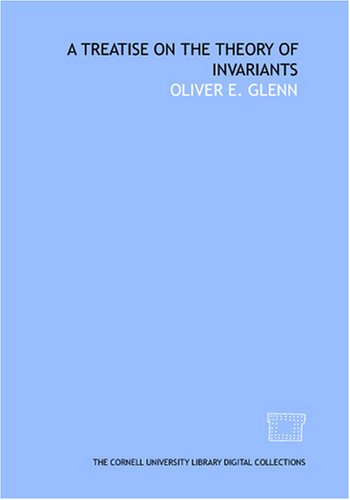A Treatise On the Theory of Functions | Date: 22 April 2011, 14:13
|
IN this book we have sought to give an account of a department of mathematics which is now generally regarded as fundamental.
A list of the men to whom the successive advances of the subject are due, includes, with few exceptions, the names of the greatest
French and German mathematicians of the century, from Cauchy and Gauss onward. And in line with these advances lie the chief
fields of mathematical activity at the present day. The most legitimate extensions of elementary analysis lead so
directly into the Theory of Functions, that recent writers on Algebra, Trigonometry, the Calculus, etc., give theories which are indispensable
parts of our subject. But since these theories are not found in many current text-books, it appears most convenient for the
generality of readers to make the earlier chapters complete in themselves. Thus an account is given in ch. i. of the geometric
representation of elementary operations; and in ch. iii., before the introduction of Weierstrass's theory of the analytic function, the
theory of convergence is discussed at some length.
We have aimed at a full presentation of the standard parts of the subject, with certain exceptions. Of these exceptions, three
must be stated. In ch. ii., the theory of real functions of fl. real variable is given only so far as seems necessary as a basis for what
follows. In the account of Abelian integrals (ch. x.), our object is to induct the reader as simply and rapidly as possible into what is
itself a suitable theme for more than one large volume. And we have entirely passed over the automorphic functions, since it was
not possible to give even an introductory sketch within the space at our disposal. However, an account of some of Kronecker's work,
which is necessary for the study of Klein's recent developments of the theory of Abelian functions, is included in ch. vi.; and ch. viii.
is devoted to a somewhat condensed treatment of double theta functions, which goes further than is necessa.ry for our immediate
purpose, for the reason that the subject is not very accessible in the English language.
Progress is intentionally slow in some places, where what isrequired is a formation of certain new concepts, rather than an
enlargement of ideas that pre-exist. As to the place of the Theory of Functions in the order of those
mathematical studies which appear in all curricula, its most elementary parts can be attacked with advantage so soon as a sound
knowledge of the Integral Calculus is gained. It will be found that, though collateral subjects such as tho theory of Algebraic
Equations and the analytic theory of Plane Curves arc freely referred to, a· previous knowledge of them is rarely necessary for
the understanding of what follows. It may be addell that an acquaintance with the present subject is requisite for the study
of the modern theory of Differential Equations. It is presupposed, for example, in Dr. Craig's treatise.
The many writers to whom we arc indebted for theories or fOll elucidations are, of course, referred to in the wxt. There has
appeared quite recently the very important treatise of Dr. Forsyth, unfortunately too late to be included in these references.
A Glossary is added, which gives the principal technical terms employed by German and French writers, with the adopted equivalents.
The page on which these equivalents are definell will be found by consulting the Index.
To our respective colleagues, Professor C. A. Scott and Professor E. W. Brown, our hearty thanks are due for valuable assistance
with the proof-sheets.
|
DISCLAIMER:
This site does not store A Treatise On the Theory of Functions on its server. We only index and link to A Treatise On the Theory of Functions provided by other sites. Please contact the content providers to delete A Treatise On the Theory of Functions if any and email us, we'll remove relevant links or contents immediately.
|
 |
|
 Comments (0)
All
Comments (0)
All










